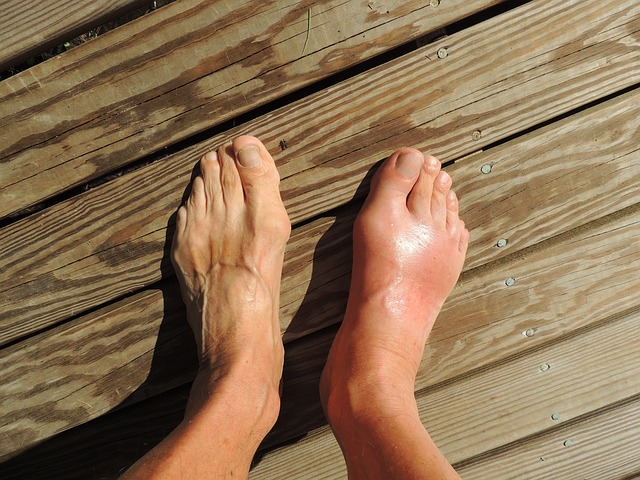Contents
What is gout?
Gout is a form of arthritis (inflammation of a joint) that can affect toe, foot, ankle, knee, and elbow joint. Gout arthritis causes sudden attacks of severe pain and swelling in the joints, often experienced at first in the big toe, and is most common in men.
What causes gout?
Gout is caused by increased levels of uric acid in the bloodstream.
Uric acid comes from the breakdown of cells in your body, as well as chemicals called purines that are found in your food. It is your kidney’s job to filter uric acid in your blood and flush it out through urination.
However, when uric acid levels are too high and your kidneys are unable to remove the excess uric acid, small crystals can form in your joints. These crystals cause inflammation and swelling which can create an uncomfortable and painful experience.
There are a number of risk factors cited that can make a person more likely to get gout arthritis. Some of these include:
- Obesity
- High alcohol intake
- A genetic predisposition
- High intake of foods rich in purines (eg: some seafoods and meats)
- Certain medicines eg: diuretics (fluid tablets)
- Injury to a joint
- Long-standing kidney disease

What are the symptoms of gout?
What does gout pain feel like?
The symptoms of gout can develop quickly, sometimes within 12 to 24 hours and can be periodic. If you’re experiencing a gout attack, you’re likely to feel:
- Severe pain and tenderness in the affected joint. Usually, gout will affect one joint at a time, most commonly your upper toe
- You might notice redness and swelling in the affected joint as well
- The skin over the joint may feel hot and tight and may look shiny and red
- Joints can become painful and stiff. Sometimes, this can be so tender that even the light pressure of bedding or a sock can cause discomfort.
A gout attack can last typically up to 10 days, but in severe cases can occur for weeks.
Who can get gout?
Gout is common in New Zealand, with an estimated prevalence of 2.7% for the overall population and a prevalence of 3.75% in people aged 20 years or older. While anyone can get gout, it commonly affects adult men (particularly after age 40) and is uncommon in women until after menopause. It is estimated to affect adult men 3.5-times more than women and is more common in people of Maori and Pacific Island ethnicity.
How is gout treated?
The good news is, with help from your doctor and lifestyle changes, the acute (right now) symptoms can be treated and long term prevention can be achieved.
- Diagnosis of gout: your doctor will diagnose gout based on your symptoms, and potentially blood tests showing high levels of uric acid or through a sample taken from a small needle put into your joint.
- Medication: If you’re diagnosed with gout, your doctor may prescribe you medication to reduce the pain you're experiencing. These can be non-steroidal anti-inflammatory medications (NSAIDs) like ibuprofen, or medication that helps to block the production of uric acid or corticosteroids (in tablet or injection form) to reduce pain and inflammation.
- Prevention: to help to make sure that gout doesn’t return once your symptoms subside, there are a number of steps you can take. These include:
- diet changes restricting or avoiding foods high in purine (ie. red meat, shellfish, bread)
- Limiting your alcohol intake, as alcohol causes the body to lose fluid (by increasing urine output and drawing water from the blood), thus increasing the uric acid levels in the blood.
- Increasing your water intake daily to help flush out uric acid
- Your doctor may choose to prescribe you urate-lowering medicines to help keep your uric acid level low.
What do I do if I have gout?
If you think you might have gout arthritis, rest until your symptoms improve, raise the inflamed joint and put an ice pack on it and do not exercise during an acute attack.
As soon as possible, make sure to book an appointment to see a doctor who can help you to treat gout. Gout is a condition that our online doctors at Bettr are able to treat. If you’d like to see a doctor about gout, book your online consultation below.
We offer same day appointments and online prescriptions. There’s no app to download, no need to change GP and no registration; just immediate healthcare wherever you are.

What we treat
Access a full suite of healthcare services
As long as it’s not a medical emergency, you can book an appointment at Bettr and get help with a wide range of healthcare services such as: ACC follow-ups, hand and foot issues, fevers, allergic reactions, rashes, skin problems, respiratory problems, coughs, cold and flu, medical certificates, oral health, mental health, and many more. For more details on what we can (and can't) treat, see our treatment services.

Enrol for more
Bettr's online doctors are available nationwide to everyone.
If you're in Auckland, Palmerston North or Christchurch, you can enrol with a clinic in our network for cheaper consults online and in-person.
If you enrol:
The price of Bettr consultations drops to $45, or $25 for CSC holders, and under 14s are FREE!
You’ll also get cheaper GP consults at your enrolling clinic, and cheaper consults at any of our Local Doctors and White Cross urgent care clinics.
*If you require face-to-face treatment following your Bettr online consult, you can be referred to one of our clinics in Whangarei, Auckland, Palmerston North and Christchurch.




